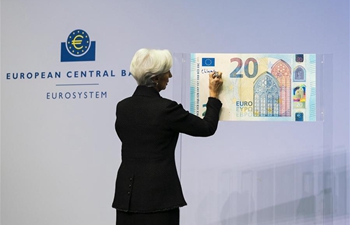LONDON, Nov. 29 (Xinhua) -- Healthcare will play a significant role in the UK voters' decisions during the general elections on Dec.12, an expert told Xinhua in an exclusive interview recently.
Tamara Hervey, professor of EU law and researcher at the University of Sheffield, believes that the concept of 'national health' is more than just about providing healthcare, and plays a social and cultural role too.
"Health relates to people's autonomy, well-being and their dignity," and therefore could play a significant role in the voters' decisions, Hervey said.
The United Kingdom's (UK) National Health Service (NHS) has been at the center of political parties' election campaigns in the run-up to the country's general election. A recent poll conducted by Ipsos MORI found that the top two issues for British adults were the NHS and Brexit.
UNDERFUNDED AND UNDERSTAFFED
The NHS has long been a service close to the hearts of the British public, and has emotional as well as practical significance. Established in the late 1940s, it was formed on a taxation-based system largely funded from general taxation that meant free healthcare for residents on the basis of need.
"In the UK, there's an idea that 'our' NHS is 'the best'," Hervey said.
However, as the UK's demographics have changed, the present NHS model has fallen under sharp criticism for being unsustainable and in need of an overhaul.
An aging British society requiring more and increasingly expensive treatments means that funding for the service needs to be re-evaluated.
Professor Hervey's research, titled "Health Governance after Brexit: Law, Language and Legitimacy," includes interviews with members of the UK health policy community and conversations with people in the street.
"Our research suggests that NHS England and the NHS Northern Ireland are indeed underfunded and understaffed," she told Xinhua.
"Independent organizations, such as the Nuffield Trust, have regularly issued studies showing this -- and also that NHS Scotland and Wales are similarly underfunded and understaffed. There are particularly significant staffing gaps in nursing," she said.
GENERAL ELECTION PLEDGES
The political parties' general election campaigns show a variety of promises of increased spending on the service and the employment of more staff.
The incumbent Conservative Party has pledged an extra 50,000 nurses. Meanwhile, Britain's main opposition Labour Party says that this will increase spending on the NHS by an average 4.3 percent a year.
"For the general public, our street conversations suggest that waiting times are a major grievance, especially waiting times to see a general practitioner, which is the gateway to hospital or more complex care in our system," Hervey said.
"There are also grievances about the costs of medicines and car parking in hospitals."
Meanwhile, Brexit is likely to have "overwhelmingly negative" impacts on the NHS, said Hervey.
"Brexit will impact every aspect of the NHS: the staff who work within it, the products they use (medicines, devices, consumables like syringes), biomedical research, and public health policies (like food or air and water policy) that affect population health," Hervey said.
Perhaps most troubling for the NHS' post-Brexit future is how it will maintain its supply chain and staff numbers, both of which are heavily reliant on the current agreement with the European Union (EU).
If no post-Brexit agreement is made, then the UK will either have to increase spending on supplies or seek alternative arrangements with other countries.
In a recent televised election debate between Prime Minister Boris Johnson and opposition leader Jeremy Corbyn, the latter accused the government of wanting to "sell off" the NHS to U.S. health firms -- an approach, if true, may be opposed by large portions of the public.
The next UK government will likely be elected on its pledges for both the NHS and Brexit (whether 'leave' or 'remain'), said Hervey.
"Many independent health organizations are calling for changes to working conditions of NHS staff, improved pay, greater investment in frontline care, and better attention to the needs of an aging population -- so making sure that social care is in place, as well as necessary healthcare for elderly people."
These changes, plus many more, will have to be considered. If they are not, it could be a dealbreaker in winning public support in the upcoming election, Hervey said.













